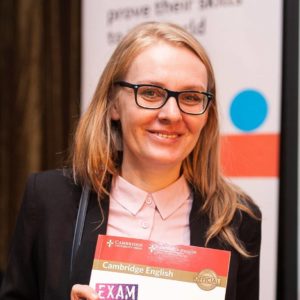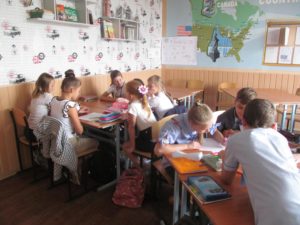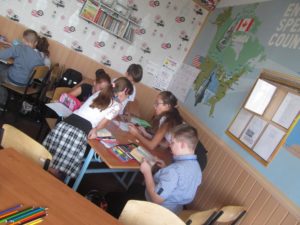Real life experiences are all part of becoming entrepreneurial, but what does that feel like to a year 1/2 pupil (ISCED Level 1 equivalent)? How do they know a good idea from a weaker one and can they articulate their decisions?
Craigfelen Primary School – an entrepreneurial school in a challenging area of Swansea
Craigfelen Primary School in Wales has its own pupil run bakery, a cafe and a special ‘Spider Bank’ where pupils can save for new ideas, and the latest is a pop-up shop. The school is set in a challenging area of Swansea and has to teach through both the medium of English and Welsh, so the extra challenge of being bilingual is an every-day consideration.
These bright pupils had asked their teacher to invite me, and following some tweets where they had introduced themselves, I popped in to meet the 5-7 years olds to see how things were progressing. I did this with an EntreAssess eye to see how they were understanding and managing the new opportunities that this idea presented.
This wasn’t teacher assessment, this was self and peer assessment
The first thing that struck me was how well Mrs Roberts, the teacher, managed to stay quiet, and allowed the children to speak for themselves, which is a skill in itself. The next was that with one single question to the class, the teacher had raised their curiosity to such an extent that the pupils were already guessing what I’d say, and had prepared a one page ‘research and guess’ page on me before my arrival. Not many University students do that!
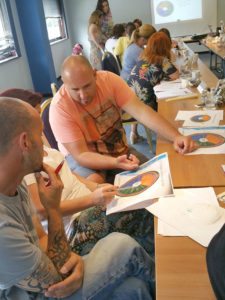
Teacher Jamie Taylor leads an EntreComp-based self-development session for his fellow Craigfelen teachers
The teaching team at Craigfelen have engaged with EntreComp since its inception, and were amongst the first in Wales to undertake the formal teacher training that my University offers. What’s more, one of these teachers, Mr Taylor, had also run his own sessions for the staff, so they were well versed in the various dimensions. These align with Wales’ new future proofing education strategy ‘Successful Futures’, which calls for learners to become creative enterprising contributors to society.
Enthusiasm from the word go
The pupils told me that that the school had offered them the old local Post Office, which their mums and dads were very sad about closing down, so they wanted to revitalize it. So whose ideas were being used here I wondered? Whilst the school had negotiated the legal issues, it soon became clear that the pupils were developing everything else.
The constant ‘hands up’ to respond to my questions was overwhelming, and the enthusiasm transparent from the word go. The pupils knew that they had to mobilize others and their resources, work in teams and play to their strengths. The levels of self-awareness became apparent when conflict resolution was managed through the development of a ‘crazy corner’ in the shop for wacky ideas that may not work; yet gave all pupils a chance to express their creativity and visioning skills. The value of these ideas would be learned through taking an initiative and learning through experience.
The levels of self-awareness became apparent when conflict resolution was managed through the development of a ‘crazy corner’ in the shop for wacky ideas that may not work; yet gave all pupils a chance to express their creativity and visioning skills.
Three groups had been formed in a class of over 20 pupils, and each group were engaged in fun and friendly competition with each other, based primarily on who had the best ideas. This was something I had to probe, and I soon found out that they had many ideas, had linked and connected these to make new ideas and were in the midst of testing them against their profiles of imagined customers. Mums, dads, aunties and uncles were drawn to help explain their likes and dislikes, and brothers and sisters drawn to express what they would persuade their parents to buy them! Even details like the colour of their mum’s handbag came into the decision making process.
Every question I asked resulted in a sea of hands in the air and ever-complex levels of creative combinations. Cookie makers and pop up card designers had joined teams to make ethically sourced pop up cookie presents and crafted clay, and story-telling were combining to make a new type of book, one that could be used to help young children to develop their own new ideas.
Learners had interpreted EntreComp into their own words
I left exhausted, and on the way home reflected on an experience where these young learners had interpreted EntreComp into their own words, could articulate their self and group development and were providing opportunities for others of their own age to learn.
I left exhausted, and on the way home reflected on an experience where these young learners had interpreted EntreComp into their own words, could articulate their self and group development and were providing opportunities for others of their own age to learn. Yes the money would be going into their own school bank, but everyone knew the reasons for this and could express the opportunities that having such funds provided. It also struck me how little the teacher had said, simply because she didn’t need to add a word when the pupils could do it for themselves.
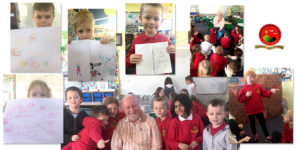
Pupil power – Andy hears about Pop Up shop ideas, evaluations and enjoys a little teacher training – from the pupils of Craigfelen Primary School
Thanks to Headteacher Alison Williams who, on behalf of the pupils, arranged the visit and details such as permissions for photographs, I think I learned a lot that day, but the pictures probably express much more than I can in the words of this blog.
By Prof. Andy Penaluna, Director of the International Institute for Creative Entrepreneurial Development, University of Wales Trinity Saint David
 In short: Craigfelan is a primary school in Wales that uses entrepreneurial learning to motivate and inspire pupils, whilst ensuring that they make progress, by using Entrecomp for teaching and assessment.
In short: Craigfelan is a primary school in Wales that uses entrepreneurial learning to motivate and inspire pupils, whilst ensuring that they make progress, by using Entrecomp for teaching and assessment.